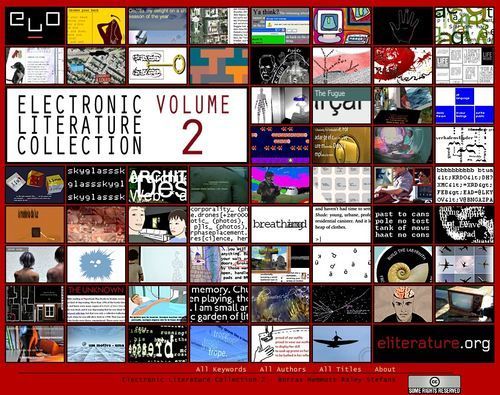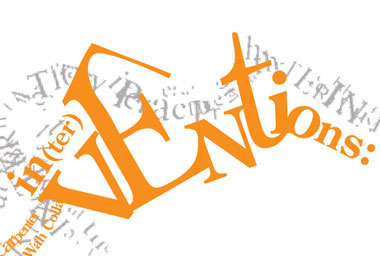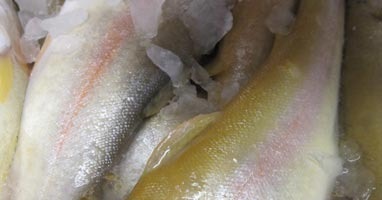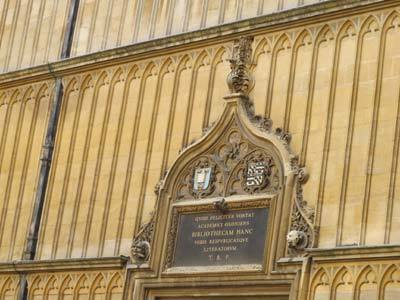J.R. Carpenter's Blog, page 9
April 4, 2011
Excerpts from the Chronicles of Pookie & JR – a sort of short story – in the Wild issue of Branch Magazine
Pookie strikes again. A sort-of short-story-like prose-esque version of Excerpts from the Chronicles of Pookie & JR appears in Branch Magazine's Wild issue, guest-edited by Alison Strumberger, launched 1 April 2011 (no joke).

Excerpts from the Chronicles of Pookie & JR is a narrative documentation of the adventures Ingrid Bachmann's hermit crab Pookie and I had during June of 2009. Pookie is not the wildest of animals, but he is pretty social, for a hermit crab. Pookie's full name is Pookie 14. Pookie is the star of a Python story generator, and my latest book, GENERATION[S]. For backstory on this story on this story, visit: http://luckysoap.com/statements/storygenerations.html
Branch Magazine is a national quarterly online magazine devoted to exploring the rifts and overlaps of visual and literary arts while showcasing emerging and professional Canadian artists and creators. Branch features contemporary literature, art and design and aims to produce a compelling panoply of art in different media. Each issue is prompted by a particular theme and, depending on how artists interpret the subject, Branch strives to present how artistic minds may bring together a magpie's nest arranged by its clash and compatibility
March 12, 2011
Best Behaviour – A Short Story Published in Dragnet Magazine
 Dragnet Magazine, a new online/eBook literary journal that "trawls the sea of stories for the best fiction," has included a short story of mine in their very first issue. The story is called Best Behaviour. It's fiction, obviously. Given my limited knowledge on the subject, the story is a short one, weighing in at just 879 words. It's based on an even shorter story. My behaviour is improving in tiny increments year by year.
Dragnet Magazine, a new online/eBook literary journal that "trawls the sea of stories for the best fiction," has included a short story of mine in their very first issue. The story is called Best Behaviour. It's fiction, obviously. Given my limited knowledge on the subject, the story is a short one, weighing in at just 879 words. It's based on an even shorter story. My behaviour is improving in tiny increments year by year.
In 2005, the Montreal-based artist-run centre Dazibao – centre de photographies actuelles commissioned me to write the text for an exhibition called Pixelware, une sublime forgerie featuring new works of digital photography by Mathieu Bernard-Reymond, Sylvia Grace Borda, Sze Lin Pang and Penelope Umbrico. Dazibao encouraged a creative approach. Rather than produce a standard 1000-word catalogue essay, I wrote four 250-word stories, one for each artist.
In response to Penelope Umbrico's series of photographs of images of mirrors and televisions take from mail-order catalogues, blown up to life size and hung on the wall again, I imagined a girl trapped – on display – in a catalogue-perfect living room trying not to ruin anything, scanning reflective surfaces searching for escape routes. This new story, Best Behaviour, speculates upon how the girl came to be in this room in the first place. I don't think it's giving too much of the story away to say that her overbearing yet massively insecure mother has a lot to do with it. Take the second paragraph, for example:
We've been living in a rented townhouse on the Forest Crescent for going on two years now, which is some kind of record for us. Twenty-two months we've baked in this avocado oven. Ninety-four weeks we've bathed in this goldenrod tub. Come over to this place that isn't quite our place, and here's the first thing my mother will tell you: "This wallpaper wasn't our idea!" Floor-to-ceiling horns-of-plenty adorn the breakfast nook. A sandy seashell wainscot rings the bathroom. Renters can't be choosers. We hang our pictures up wherever former tenants left nail holes.
This first issue of Dragnet Magazine contains some great stuff in it, including stories by Sheila Heti and Jacob Wren. You can read the issue on your computer, as a Website, Flipbook or eBook; on your tablet as a Flipbook or an eBook; or on your phone or eReader as an eBook. For links to all these formats, visit Dragnet Magazine online: http://dragnetmag.net/
To read Best Behaviour on the Dragnet Magazine website visit: http://dragnetmag.net/?q=content/j-r-carpenter-best-behaviour
March 10, 2011
Entre Ville and in absentia included in the Electronic Literature Collection Volume Two
Two of my web-based works – Entre Ville and in absentia – are included in the Electronic Literature Collection Volume Two, which launched in February 2011. [Prese Release]

I'm thrilled that Entre Ville and in absentia appear together in this collection. In many ways, they are the before and after pictures of my old neighbourhood, Mile End, Montreal, where I lived for seventeen years.
Entre Ville was commissioned in 2006 by OBORO, an artist-run centre in Montreal, on the occasion of the 50th anniversary of the Conseil des Arts de Montreal. Although I had lived in Montreal for 15 years at the time of the commission, Entre Ville was my first major work about my adopted city. It took me that long to learn the vocabulary. I don't mean French, or Greek, Italian, Portuguese, Yiddish or any of the other languages spoken in my neighbourhood. I refer, rather, to a visual, tactile, aural, sensorial vocabulary. My home office window opens into a jumbled intimacy of back balconies, yards, gardens and alleyways. Daily my dog and I walk through this interior city sniffing out stories. Poetry is not hard to find between the long lines of peeling-paint fences plastered with notices, spray painted with bright abstractions and draped with trailing vines. Entre Ville is a web-based heat-wave poem presented in the vernacular of my neighbourhood, where cooking smells, noisy neighbours and laundry lines crisscross the alleyway one sentence at a time.
In an intimacy
born of proximity
the old Greek lady and I
go about our business.
Foul-mouthed for seventy,
her first-floor curses fill
my second-floor apartment;
her constant commentary
punctuates my day.
Six months after the launch of Entre Ville, the "star" of Entre Ville, "the old Greek lady," was evicted from the apartment where she and her husband had lived for twenty-three years. Many long-time low-income tenants were being forced out of the neighbourhood. Fiction was the only way I felt I could give voice to their stories. Our stories – I felt certain my time would come soon enough.
in absentia is a multi-authored multi-lingual site-specific web-based writing project which addresses issues of gentrification and its erasures in the Mile End neighbourhood of Montreal. Faced with imminent eviction, I began to write as if I was no longer there, about a Mile End that was no longer there. I manipulated the Google Maps API to populated "real" satellite images of my neighbourhood with "fictional" characters and events. in absentia is a web "site" haunted by the stories of former residents of Mile End, a slightly fantastical world, a shared memory of the neighbourhood as it never really was but as it could have been. in absentia was created in 2008 with the support of the Canada Council for the Arts. It was presented by DARE-DARE Centre de diffusion d'art multidisciplinaire de Montréal. It launched June 24, 2008. New stories were added over the summer, in English and French. A closing party was held in conjunction with the launch of my novel, Words the Dog Knows, (conundrum press), at Sky Blue Door, November 7, 2008.
This is the second collection published by the Electronic Literature Organization. The Electronic Literature Collection Volume One, edited by N. Katherine Hayles, Nick Montfort, Scott Rettberg and Stephanie Strickland, also included one of my works – The Cape. The long-awaited Electronic Literature Collection Volume Two, edited by Laura Borràs, Talan Memmott, Rita Raley, and Brian Kim Stefans, includes 63 works from Austria, Australia, Catalonia, Canada, Colombia, France, Germany, Israel, The Netherlands, Portugal, Peru, Spain, UK, and USA; written in Catalan, Dutch, English, French, German, Portuguese, and Spanish; Flash, Processing, Java, JavaScript, Inform, HTML, and C++.
ELC2 speaks to both the continuity as well as the bright future of electronic literature. The works include many of the emerging categories of e-lit: mash-ups, geolocative, codework, as well as "traditional" and evolving forms such as hypertext, chatbots, and interactive fiction. The authors list presents readers with both veterans and newcomers to the field.
Electronic Literature Collection Volume Two
February 7, 2011
In(ter)ventions: Literary Practice at the Edge Residency at The Banff Centre
It's plus 12 degrees Celsius in south west England. Snow drops in blossom in the glade along the drive. Lambs frolicking in green fields. And I'm preparing to depart for Banff, Alberta where the high today was minus 14 and the white is not blossom but snow. Why? Why, for the love of literature of course. And, for the love of mountains.
I'm thrilled to be returning to Banff once again, this time to serve as faculty for In(ter)ventions: Literary Practice at the Edge, an new residency offered by Literary Arts at The Banff Centre February 14, 2011 – February 26, 2011.
Faculty:
Fred Wah – collaboration and hybridity
J. R. Carpenter – digital literature
Lance Olsen – new narrative
Guest Speakers:
Oana Avasilichioaei
Debra Di Blasi
Erin Moure
Darren Wershler
I'll be performing along side Darren Wershler and Lance Olsen at The Club, Theatre Complex at The Banff Centre Thursday, February 17, 2011 – 7:30 pm. [more info]

January 17, 2011
CityFish to be presented at OLE Officinia di Letteratura Electtronica, exhibited at PAN Palazzo Arti Napoli
I am gearing up to present a paper on my most recent work of electronic literature – CityFish – at the OLE Officinia di Letteratura Electtronica Festival / Conference taking place in Naples 20-21 January 2011. The very full program boasts an impressive roster of speakers. I am looking forward to seeing old friends and new work. I especially love how, in a sea of big names and long conference paper titles written in Italian, Spanish, French and English, shot through with colons, semi-colons, dashes and all manner of accentuation, my title is written just like this – "CityFish" – one word, written in its own made-up language, buoyed by quotation marks, impossible to translate, and anyway, there is no reason to. The rest of the paper will be translated, however. All of the papers presented at OLE Officinia di Letteratura Electtronica will appear in Italian translation in a book published by Feltrinelli in Italy. I have the greatest of sympathy for the translators of this odd-ball essay about this quirky work about this talking dead fish.

CityFish is a hybrid word, title of a hybrid work, tale of a hybrid creature. A big fish story swallowing a small tale's tail. A rhizome, a fable, an urban legend. Like an old wives' tale, it's long been told but is never quite finished. In its latest incarnation, CityFish is a web-based hypermedia panoramic narrative. Completed in November 2010, with the support of a new media creation grant from the Canada Council for the Arts, CityFish was presented in Beta at Archive & Innovate, The 4th International Conference & Festival of the Electronic Literature Organization, at Brown University, in Providence, Rhode Island, USA, June 3-6, 2010. CityFish was also presented as a work-in-progress at Interventions: Literary Practice at the Edge: A Gathering, at The Banff Centre, in Banff, Alberta, Canada, February 18, 2010. The Coney Island videos were shot on location in 2005 and edited during the Babel Babble Rabble: On Language and Art thematic residency at The Banff Centre in 2006. A very, very, very early web-based iteration of CityFish was presented in an exhibition called IßWAS, at the Bavarian American Hotel in Nuremberg, Germany, July 1998. That iteration incorporated a series of photographs shot on 35mm film in Chinatown, Toronto, circa 1996; a line drawing of a fish with a tall building for a tail, drawn at around the same time; and a very short story of the same name written in 1995 from the first-person point of view of a fish.
CityFish is a simple story told by a simple fish, most unhappy about being caught, killed and offered up for sale, piled unceremoniously in a heap on a sidewalk fishmonger's stall on a hot summer day, on a narrow, crowded street in Chinatown, New York City. "What a fish, once was I," the fish reminisces. "A fish's fish, with fish's thoughts inside my head." Fish are far from us. Their stories breathe with gills, swim in deep cold water and are never still. They cannot help but seem strange to us. As Henry David Thoreau noted in Cape Cod, a book named after a piece of land named after a fish:
All that is told of the sea has a fabulous sound to an inhabitant of the land, and all its products have a certain fabulous quality, as if they belonged to another planet, from sea-weed to a sailor's yarn, or a fish-story. In this element the animal and vegetable kingdoms meet and are strangely mingled.
CityFish will be exhibited at PAN Palazzo Arti Napoli for a month after OLE Officinia di Letteratura Electtronica, and may be viewed anytime from anywhere online here: http://luckysoap.com/cityfish
PAN Palazzo Arti Napoli
via dei mille 60, napoli
tel. +39.081.7958604-05
fax. +39.081.7958660
info@palazzoartinapoli.net
www.palazzoartinapoli.net
An article about OLE Officinia di Letteratura Electtronica appeared in the Italian newspaper Il Corriere della Sera 8 January 2011: Arriva la letteratura elettronica
December 31, 2010
Reading List 2010
This is not a best-of list. This is just a list. This may be the least amount of books I've read in one year in many a year. The list of reasons why this list is so short may be longer than this list. The sad fact remains that most of my books remain in storage in Montreal, whereas I, happily, remain in England. Though my books stubbornly remain in one place I have been travelling a lot. Destinations this year — for work, pleasure, and most often both — included: Banff, Ottawa, Leicester, Oxford (twice), Vienna (twice), Montreal (twice), Vermont (twice), New York (just the once, alas), and back and forth between London, Bristol, Bath and Falmouth too many times each to count.
I wrote a book this year, which took up a bit of time. More about that here. I made a massive new work of electronic literature. More about that here. And I started a practice-led PhD research degree in the fall. My days of reading for pleasure are over for the foreseeable future. Though I do take pleasure in most of what I'm reading now, the reading itself is slower, heavily annotated, highly fragmented and ever so much more deliberate than reading led purely by the pleasure of leaping from one book to the next. That said, in addition to my own university library card, I now also have reader's card's for the British Library and the Bodleian Library at Oxford — two of the greatest libraries in the world — where I intend to spend as much time as possible reading bits and piece archival material, maps, manuscripts and extremely old books, none of which may appear on next year's book list. Oh well.

The thing about lists is, they don't show what's not on them. I've read the equivalent of many more books than the ones listed bellow in parts and portions. I have a stack of at least ten books open and in heavy use, none of which I intend to read in full. Much of the reading I've done over the past few months has not been from books at all. I have been spending a lot of time in the British Library Maps collection. I am pleased as punch with my subscription to Cabinet Magazine, for example. And remain an avid consumer, collector, creator of zines. As a newly minted sort of semi academic, application forms, rules and regulations, conference proceedings, journal articles and web archives have taken over a sizable portion of my reading life. And then, there's my crippling addiction to online Scrabble. But let's not get into that.
Scanning this list of the books read in full this year, a few come flooding back so vividly they are worthy of special mention, though to reiterate, this is not a best-of list. Just an an aide-mémoire. I think about Alice Oswald's Dart everyday because it's about the River Dart, which runs right outside my window, which used to be Alice's window (she used to live where I know live and now lives down the road). I remembered just how much I love Larissa Lai's chapbook Eggs in the Basement when I used it recently to teach an MA seminar on computational poetry. Though, or perhaps because, Eggs in the Basement is not computer generated, it offers a fantastic entry into computational poetics without all that pesky computation getting in the way. Bits and pieces of Cynthia Ozick's The Cannibal Galaxy keep coming back to me, for being-an-immigrant reasons too complex to explain herein, and for similar reasons Hans Fallada, Alone in Berlin chilled me to the bone. I re-read Shakespeare's The Tempest on impulse over the summer and cannot believe how absolutely central to my thesis it is becoming. Likewise, I am so glad I never read Daniel Defoe's Robinson Crusoe until this fall as now I come to it with a completely different set of preoccupations than I would have when much younger, resulting in a startlingly different reading than that which all previous commentary had led me to suppose the book was about.
Despite my quip about my days of reading for pleasure being over, I am looking forward to many of the books my research is leading me into. Especially since the PhD comes with a studentship, which is more commonly called a fellowship in North America, though I think of it more generally as a book buying budget, with mad money left over for train travel to libraries London and Oxford and anywhere else the reading leads.
Happy reading.
Tom McCarthy, C
Michael Boyce, Anderson
Merlin Coverley, Psychogeography
Darren Wershler-Henry, The Iron Whim: A Fragmented History of Typewriting
Timothy C. Campbell, Wireless Writing in the Age of Marconi
Michel Tournier, Friday
J. M. Cotzee, Foe
Daniel Defoe, Robinson Crusoe
Mary Butts, Ashe of Rings
Rebecca Solnit, A Field Guide to Getting Lost
Henry David Thoreau, Walking
Patrick Wright, On Living in an Old Country
Hans Fallada, Alone in Berlin
Félix Fénéon, Novels in Three Lines
Bernard Malamud, The Magic Barrel
Cynthia Ozick, Dictation
Mavis Gallant, The Selected Stories of Mavis Gallant
Elizabeth Strout, Olive Kitteridge
Medlar Lucan & Durian Gray, The Decadent Gardener
Shakespeare, The Tempest
Elizabeth Hay, Late Nights on Air
Alistair MacLeod, Island
Italo Calvino, Difficult Loves
Patrick McCabe, The Butcher Boy
N. Katherine Hayles, Electronic Literature: New Horizons for the Literary
Henry David Thoreau, Cape Cod
Jerome K. Jerome, Three Men in a Boat
George Eliot, Middlemarch
Cynthia Ozick, The Cannibal Galaxy
Isaac Bashevis Singer, The Spinoza of Market Street
Andy Diggle & Jock, The Losers
Merce Rodoreda, My Christina & Other Stories
Larissa Lai, Eggs in the Basement
Vladimir Nabakov, Nabakov's Dozen
Lance Olsen, Anxious Pleasures
Iain Sinclair, Hackney, That Rose-Red Empire: A Confidential Report
W. G. Sebald, Vertigo
Jean Webster, Daddy Long legs
Mavis Gallant, In Transit
Alexandra Leggat, Animal
Ron Carlson, Five Skies
Walter J. Ong, Orality & Literacy: The Technologizing of the World
Arther Conan Doyle, The Hound of the Baskervilles
Alice Oswald, Dart
READING LIST 2009 >>>
READING LIST 2008 >>>
READING LIST 2007 >>>
READING LIST 2006 >>>
READING LIST 2005 >>>



